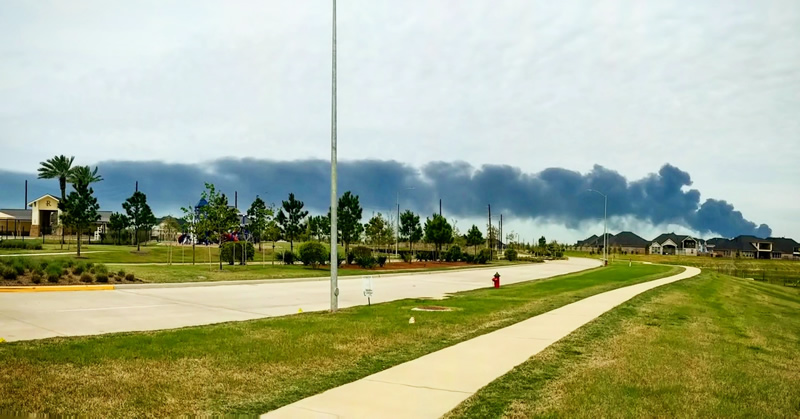
As of Tuesday afternoon, in a news conference concerning the Deer Park Petrochemical facility, a spokesperson for the company that owns the Intercontinental Terminals Company (ITC) facility said 8 out of the 15 tanks were still on fire. The fire started Sunday and was officially extinguished about 3 a.m. Wednesday.
Texas Railroad Commissioner Ryan Sitton said the air quality monitoring showed the situation was not dangerous for residents because there are no toxins in the air. However Dr. Winifred Hamilton, the Director of Environmental Health Science at the Baylor College of Medicine said “They’re really talking about acute, immediate health effects, and we may still see some of those”
Dr Winifred continued to explain that in addition to an area with air pollution during a heavy month of air pollen, “on top of that, now we have this big plume of tiny combustion particles and gases and also these volatile organic gasoline type chemicals adding additional stress to our bodies”
Although the Harris County Public Heath said air monitoring levels do not indicate unsafe levels from the ITC Deer Park fire, it’s an “Evolving situation” and those experiencing symptoms should call a doctor.
It may be considered “Evolving” due to reports of air quality being tested on the ground level from the Texas Commission on Environment Quality, HCPH, and ITC and the smoke plume hovering over the area could shift towards the ground at any point.
What chemicals were burning in the tanks at the ITC facility?
According to news sources, xylene, naphtha, toluene & pygas were chemicals listed among base oil and gas blend that were stored in the large containers that were burning since Sunday. Each of the chemicals have both acute (short term) and chronic (long-term) health effects associated with inhalation and the health impacts could range from irritation of the skin, eyes, nose, throat & lungs, to central nervous system dysfunction, brain damage, attention deficits, and minor craniofacial and limb anomalies, in the children of pregnant women exposed to high levels or mixed solvents in addition to being linked to Benzene a known carcinogen and cancer hazard.
Health Complications, Claims, and Lawsuits
Reports of breathing problems from plant workers and area residents alike have been surfacing that are consistent with respiratory exposure to xylene, naphtha, toluene & pygas. Symptoms from inhaling these chemicals could include difficulty breathing and burning, irritation and redness to eyes, nose and throat in addition to headaches, nausea or dizziness.
In response to these reports, the Intercontinental Terminals Company (ITC) has created a claims website were both individuals and businesses can file a claim form for economic loss, however #4 on Page #4 will release ITC from any future lawsuit or claim.
This may not be in the best interest of individuals or businesses suffering any loss since they would waive their rights to recover medical expenses, lost wages and other damages as a result of the fire by accepting any payment from ITC.
Contact our law office today for a free confidential consultation. Learn more about your legal rights, options, the ITC claims website, and compensation for losses.
